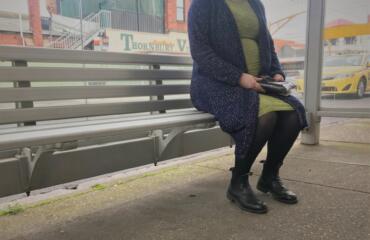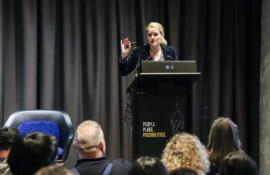Late one night in April, at the height of the first wave of COVID-19 pandemic restrictions in Australia, University of Sydney student Shuwang* escaped the tedium of lockdown by logging into his favourite distraction, ‘Overwatch’, a team-based shooter game set on a near future Earth.
The 20-year-old Chinese international student and his team quickly scored a decisive win. But as Shuwang and his teammates celebrated and prepared to start a new round, their moment of joy quickly vanished.
A message came through from their rivals. Shuwang’s heart sank as he read the text: “I think you guys eat bats.”

“Competitive gaming focuses a lot on your skill ranking, in which you move up to a new level by gaining wins,” says Melbourne-based student Jacky Yang. “It’s easy to get emotional if you meet a bad player, and racist attacks become the way these people release the anger.” Image: Nicholas Perez/Unsplash
In the online gaming world, racism has long been a problem. According to a survey by Jewish organisation the Anti-Defamation League and e-sport analytic firm Newzoo last year, 23 percent of 1,045 American video gamers were exposed to white supremacy conversations during online gaming.
It’s been reported that racial slurs, name calling and nasty abuse often occurs on video gaming platforms and community forums. Nonetheless Shuwang has largely managed to drown out the noise enough to relax and enjoy his pastime.
But COVID-19 has changed that. In Australia, according to Shuwang and other gamers, there are signs that incidents of escalating racism powered by the pandemic have found their way into the online realm where many young people have gone for company and comfort during lockdown.
According to Interactive Game and Entertainment Association (IGEA), during the week of March 16, when Australia implemented its first wave lockdown, digital sales of video games doubled. Other industry figures indicate that sales of games and consoles rose by almost three times that week, according to a report by The Sydney Morning Herald.
But players like Shuwang also quickly noticed a spike in racial attacks inside their gaming community, a trend reflected in society more broadly.
In July, the Asian Australian Alliance released a report on racism during COVID-19. The report collected 377 COVID-19 racism -elated incidents from April to June, and found roughly one in ten happened online. A follow-up study conducted for the alliance in September showed around one third of the 1100 Australians surveyed believed Chinese people brought coronavirus to Australia.
As a longtime player who habitually spends around eight hours per day on video gaming, Shuwang says racism has always been part of the scene. “I have these sorts of experiences almost every week,” he says. “I don’t argue with [the racist commenters]. I will just see them as someone who is uneducated.”
Shuwang’s favourite game, Overwatch, published by American gaming giant Blizzard in 2016, is one of the most popular multiplayer shooting video games in the world. In 2018, the company announced it had reached around 40 million players for the game. In Blizzard’s latest report, the company announced engagement had “meaningfully increased” in March as a result of the global lockdown.
In Overwatch’s Australian community, Shuwang uses a Chinese-language ID, and recalls being disparaged with the term “Ching Chong” several times. “Some people just behaved racist when they lost the game,” he says.
But as COVID-19 hit Australia, Shuwang noticed the pandemic had also sparked virulent new forms of racal attacks against Asian players. “In the past they might just say ‘Ching Chong’, but now they will call you ‘COVID-19’ or virus-related terms,” says Shuwang. “But if you play on an Asian (network) server, you rarely encounter this.”
Reflecting on his experiences online, Shuwang says he feels he was desensitised by the sheer number of racist encounters he had. Which is not to say that he hasn’t tried to push back.
“When I saw these racist attacks, I would report (them to the game developer). But since I started playing this game, I’ve never received any feedback regarding my complaints about racism,” says Shuwang.
“I don’t know if that was because the penalty for those who act racist is too low, or if they actually don’t have penalties for those who commit racism.”
Shuwang is worried that the elevated tenor of racism in video gaming, which has been exacerbated by COVID-19, will continue long after restrictions ease. “I don’t think the pandemic will be over soon,” he says. And if there are future waves in Australia, he’s worried that they will inspire more attacks.
Jacky Yang, a 22-year-old Monash University student, was also called “Chinese virus” several times when playing Overwatch on Australia’s server. “It was around February and March, the time when many Australians weren’t yet familiar with COVID-19. (Some of them) thought the virus was from China,” says Yang.
Yang’s interest in video games grew after he arrived in Melbourne three years ago. “My friends led me to the game. I felt bored so I started playing games with friends.”
He played four to five hours per day, and when it came to weekends, he might spend whole days in front of the computer.
During the lockdown, Yang also played Animal Crossing, a console game that went viral globally during the pandemic.
Yang saw a rapid growth of players in both Overwatch and Animal Crossing, but he said competitive gaming like Overwatch was much more likely to push racism to the surface.
“Competitive gaming focuses a lot on your skill ranking, in which you move up to a new level by gaining wins,” says Yang.
“This requires you to be paired up with good teammates, or matched with good rivals. It’s easy to get emotional if you meet a bad player, and racist attacks become the way these people release the anger.”
Andrew Kinch, founder of GameAware, an organisation which provides mental health support for gamers, agrees that gamer performances can activate aggression. “And it turns out that If you have expectations to feel competent, such as performing well in a multiplayer game, but those expectations aren’t met, then that leads to frustration and frustration certainly leads to aggression.”
Kinch doesn’t subscribe to the notion that violent scenes from shooter games can themselves spur gamers’ aggressive behaviour, but he does agree that multiplayer games like Overwatch are more likely to inspire abusive behaviour, as they strongly emphasised teamwork.
Kinch says there is evidence of players expressing deeply held racist views in their aggressive interactions with Asian players. But he also argues that some players, particularly young ones, perhaps lacked the maturity and education to recognise that their behaviour was racist.
“They might not mean to be racist, but they might lash out because of competition and anonymity.”
Kinch says he’s seeing many developers now introducing reward systems for good behaviour in games, and that this contributes to building a positive environment and reducing toxicity in the online culture. He’s urging developers to keep reinforcing messages of positive sportsmanship.
The Interactive Games and Education Association, the peak body representing Australia’s gaming industry, told The Citizen that many Australian video game companies had robust tools within the games to help players manage their engagement with other players, and to block and report inappropriate behaviour.
“On the back of recent events, many video game companies have committed to further strengthening the tools, moderation and other functions to make games an even safer and more enjoyable environment,” said IGEA.
Despite the toxic experience, Shuwang says he is still enthusiastic about online games, and that they’ve also been a wonderful source of friendship and support, particularly during the COVID-19 lockdown. “Some people notice that I’m from China, then they would ask me the situation in China, and said they hoped I would take care of myself.”
“There are still lots of good people there.”
*The interviewee requested not to be identified by his real name.



